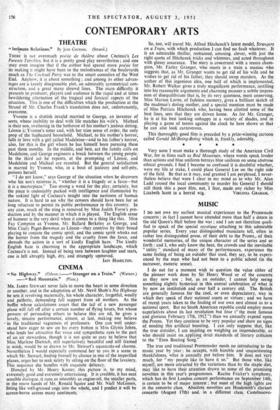CONTEMPORARY ARTS
THEATRE
" Intimate Relations." By Jean Cocteau. (Strand.) THERE is not overmuch poisie de thedtre about Cocteau's Les Parents Terribles, but it is a pretty good play nevertheless ; and one may even imagine that if the author had spared more poisie for its making it might have been to the melodramas of the boulevards much as The Cocktail Party was to the smart comedies of the West End. Anyhow, it is about something ; and among its other advan- tages are a keenly disagreeable plot, an admirably symmetrical con- struction, and a great many shrewd lines. The main difficulty it presents to producer, players and audience is the rapid and at times bewildering alternation of the tragical and farcical aspects of the situation. This is one of the difficulties which the production at the Strand d'f Mr. Charles Frank's translation does not, unfortunately, overcome.
Yvonne is a sluttish invalid married to George, an inventor of sorts, whose inability to deal with life matches his wife's. Michael is their son, sweltering in the hothouse of his mother's jealous doting. Leonie is:Yvonne's sister and, with her trim sense of order, the only prop of the haphazard household. Michael, to his mother's horror, falls in love with a girl called Madeleine—and to his father's horror, also, for this is the girl whom he has himself been pursuing these past three months. In the middle, and best, act the family calls on Madeleine, and George engineers a break between the young people.' In the third act he repents, at the prompting of Leonie, and Madeleine and Michael are reunited. But the general satisfaction is marred by Yvonne, who, in a bout of jealousy and self-pity, poisons herself.
" I do not know," says George of the situation when he discovers who his son's mistress is, " whether it is a tragedy or a farce—but it is a masterpiece." Too strong a word for the play, certainly, but the piece is undeniably packed with intelligence and illuminated by the unkind light of Cocteau's insight into the nastiness of human nature. It is hard to see why the censors should have been for so long reluctant to permit its public performance in this country. In any case, much of the sting is removed by Miss Judith Furse's pro- duction and by the manner in which it is played. The English sense of humour is the very devil when it comes to a thing like this. Miss Fay Compton as Yvonne, Mr. Ballard Berkeley as George, and Miss Cicely Paget-Bowman as Leonie—they contrive by their broad playing to conjure the comic spirit, and the comic spirit whisks out the horror from the tragedy and the cruelty from the farce, and shrouds -the action in a sort of kindly English haze. The kindly English haze is charming in the appropriate landscape, which Cocteau's- is not. Instead of being torn between laughter and tears, one is left abruptly high, dry, and strangely u9moved.
JAIN HAMILTON.






























 Previous page
Previous page